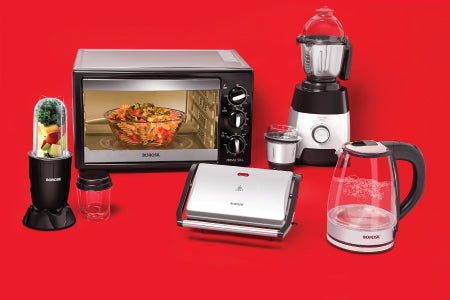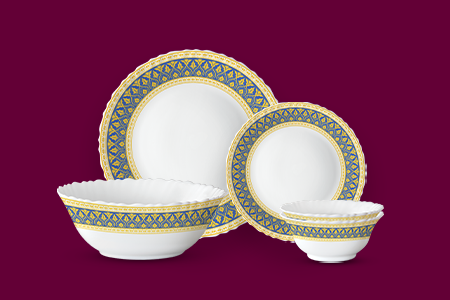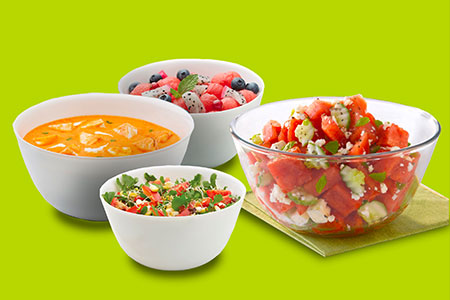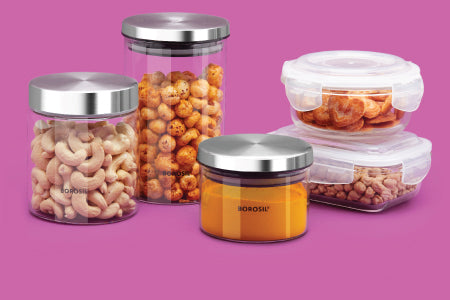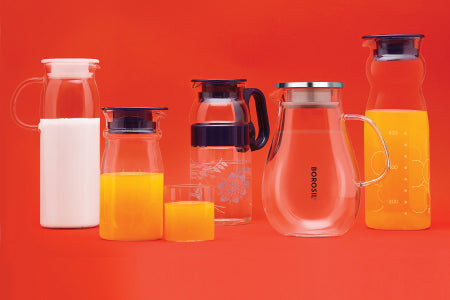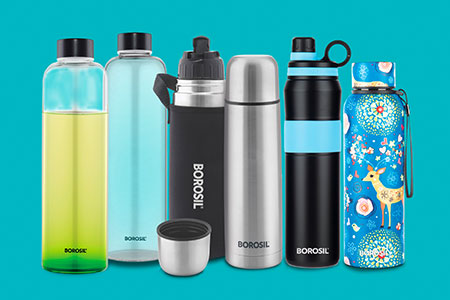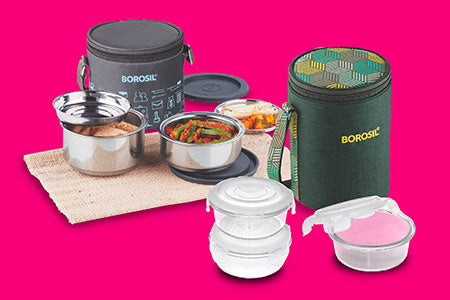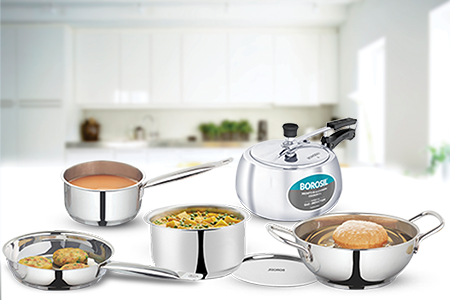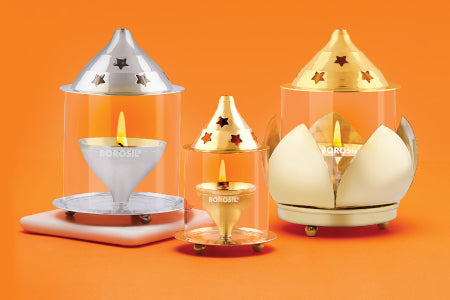
Comparing Bakeware - Glass Vs Metal Vs Silicone
Do you like to bake? Better yet, do you enjoy eating baked goodies? Yes? Us too. Multiple factors affect the quality of your baked goods. Starting with the ingredients and the cooking time till the process involved. But did you ever imagine that the type of baking dish you use or at least plan to use affects the quality of food? Yes, it obviously does! So, if you have stockpiled a vivid collection of diverse bakeware, here is what you must understand.
Glass vs Silicone vs Metal Baking Pan - A Comprehensive Overview
To help you with quick decisions, here is a comprehensive overview of glass bakeware vs metal vs silicone bases.
Glass Baking Dish
Glass isn't the best conductor of heat, but a Borosil baking dish is a great insulator. It absorbs more heat & makes your food bake faster. It can withstand temperatures up to 350°C! A borosilicate baking dish or a glass baking dish is perfect for pies & loaves of bread. Glass being transparent makes viewing easier, so if you see any unwanted browning, you can immediately adjust your oven.
Unlike plastic or ordinary glass, borosilicate glass does not leach chemicals into your food. Glass bakeware sets being inert, are super safe to use, even with acidic foods like tomatoes or citrus fruits.
Moving on in the debate of glass baking dish vs metal vs silicone, a glass dish for baking has only 1 con. Since it is made of glass, it can shatter. Completely overcome that con with Borosil glass dishes. They can withstand extreme temperatures and will never shatter in the oven. They are both microwave and freezer safe. In addition to that, they are also scratch-resistant and way tougher than ordinary glass.
Borosil glass dishes don't absorb stains or odours and can easily be cleaned in the dishwasher. Even after repeated usage, your glass dish will retain perfect clarity.
Also Read: Stainless Steel vs Glass vs Copper, the healthiest water bottle to use
Metal Baking Dish
Most metal pans are made with aluminium, an excellent conductor of heat. What does that mean for baking? It means your food will cook quickly & efficiently with perfect browning! Aluminium tins are perfect for cakes, brownies & cookies. You'll find special cake aluminium tins, brownie tins, cupcake tins, bread tins & a lot more!
Aluminium is a light metal, so it behaves differently from dark metals. It will retain less heat but offer more evenly cooked food without overcooking the corners or turning them brown. Baking tins made from dark metal absorbs more heat & behave much like glass dishes. They are perfect for loaves of bread & pies since they require a crisp crust, unlike brownies or cakes.
However, you need to be mindful of the quality of the metal pans and select the one with the ultimate food safety features. Avoid prepping highly acidic food in metal pans. For example - when baking a berry cobbler or a crisp, use glass bakeware instead.
#BorosilTip: Lower the temperature by 25°C if you're worried about too much browning.
Silicone Cake Moulds
There's a lot that silicone does for you. It's lightweight, non-reactive, shatterproof, and non-stick. That's almost every pro in the book. One major con would be that it isn't a conductor of heat. So goods baked in silicone moulds need quite a bit of cooking time. Also, keep in mind since it's ~wiggly~ it has to be handled with extreme care when it's filled with batter.
Even after all these, moving on to the glass vs silicone bakeware vs metal list, silicone bakeware is easy to use and great for storage. Moreover, high-quality food-grade silicone bakeware will not react with your food or release toxic chemicals.
If you are into oil-free or low-fat cooking, use silicone moulds, trays and mats as needed. Owing to the flexible nature of the particulars, these do not require you to grease them with extra butter or oil before baking. But dry out the silicone moulds and sheets after every use. Otherwise, they might get discoloured over time.
A Tabular Comparison Of Glass Bakeware vs Silicone Bakeware Metal Bakeware
The table here offers a detailed overview of the individual properties of various baking dishes - glass, metal, and silicone, in terms of heat conduction and durability, besides their best uses.
Bakeware And Its Characteristics |
Durability |
Heat Conduction |
Best Uses |
Glass |
Invest in borosilicate-made glass bakeware. It will last you long. Also, these are scratch-resistant and will help you with a complete guarantee against high temperatures (upto 350 degrees Celsius). |
Glass bakeware will take time to heat up. However, once it absorbs the maximum heat, you will get well-cooked outputs with a golden brown finish. Also, glass does retain heat for the longest, helping you serve food while it is warm. |
You can cook pies, baked pasta dishes, or crumbles with glass bakeware. |
Metal |
When you treat one with care, metal bakeware will last you for years. Use the right cleaner, and the pan will never leave your side. |
Metal bakewares are great conductors of heat. Thus offering your bakes the right amount of colour and texture. |
Use metal bakeware to cook cupcakes, cakes, loaves and muffins. |
Silicone |
Silicone bakeware of the right quality is highly durable. Until you are not using abrasive cleaners, they will last you multiple years. |
It is not a good conductor of heat. Compared to glass or metal bakeware, silicone bakeware cools down much faster. |
You can use it to bake delicate cakes you do not want to get brown on the surface. Cupcakes and muffins are the best examples. |
Important Tips To Maintain Hygiene Of Your Baking Pans Clean
Once done with the usage part, here is how you can clean up your baking pans afterward.
Glass Cleaning Technique
When using borosilicate glass bakeware, you can put them in the dishwasher or opt for handwash. But avoid abrasive cleaners or scourers to clean off burned stains. This will cause unnecessary scratches. When you have too many stains or dry food sticking to the interiors of the glass bakeware, leave it under water for some time and then continue with the washing part.
Achieve Squeaky Clean Metal Pans
It is always best to handwash your metal pans and store them in a cool and dry place. Also, ensure to abide by the instructions from the manufacturer while washing the pans. If we consider silicone bakeware vs metal bakeware, metals are vulnerable to discolouration, oxidisation, and rusting based on how you wash them.
Use Silicone Bakeware At Its Best
While most silicone bakewares are dishwasher safe, you must still check the user manual. Silicone is usually easy to clean. However, washing off stubborn food sticking inside the edges gets a bit hectic in the dishwasher. That way, opting for handwash is the best option. While storing, keep the silicone mould away from sharp objects to prevent damage.
Essential Baking Tips You Must Know
Now that you know the essential features of each bakeware, read on to find out certain essential baking tips that will help you with tasty outputs.
- Use the right ingredients for baking a particular item, follow an accurate recipe and avoid using substitutes. This will affect the taste and output of the item, making it taste different than the regular.
- Weigh all the ingredients using appropriate measuring spoons and cups. Always use a transparent measuring cup when measuring liquid ingredients.
- Invest in the right bakeware based on the item you are planning to bake. For cupcakes, you can opt for silicone baking trays. For savoury items which require continuous temperature monitoring, glass baking pans are appropriate, and for brownies and cakes, use a metal pan with a flat base.
- Bake your favourites by lining the baking tray with parchment paper. Except for the silicone moulds, you can use the technique for glass and metal bakeware. This will prevent the food from sticking to the wall of the pan and cause less hassle on your part.
- Ensure you have preheated the oven before inserting the baking tray with added ingredients.
Conclusion
Baking is all about patience and keeping up with an open mindset. Also, it does help one come up with great recipes, treating their loved ones around. However, choose the ingredients and appropriate bakeware to produce the ultimate bake.
Remember, all these materials have their pros & cons. The best takeaway for someone who has amassed a collection of baking materials would be to use different tins for different recipes.
Fun-fact: India's baking industry is one of its largest food-processing industries.
You'll find many baking dishes online in various shapes! Round aluminium tins, oval glass baking dishes, heart-shaped silicone moulds & a lot more unique shapes & sizes to experiment with. Each is unique and comes as the best in its own way.
FAQs
1. Which is better, glass or metal bakeware?When in a dilemma about glass bakeware vs metal, go for the one made of glass. Though it takes time to heat, once heated, the glass will retain the temperature for a long. In metal, things can get a bit difficult to handle. Proven, it gets heated up too quickly and can burn your food.
2. What are some of the benefits of using good bakeware?
Good bakeware helps with even heat distribution, is versatile, can be used for different recipes and are mostly oven-safe. You can use those as per your need.
3. What is the advantage of a glass baking tray?
A glass baking tray distributes heat evenly. It will not heat up eventually, but once it does, the glass tray remains heated for a long time. This will help you with a properly baked output.

